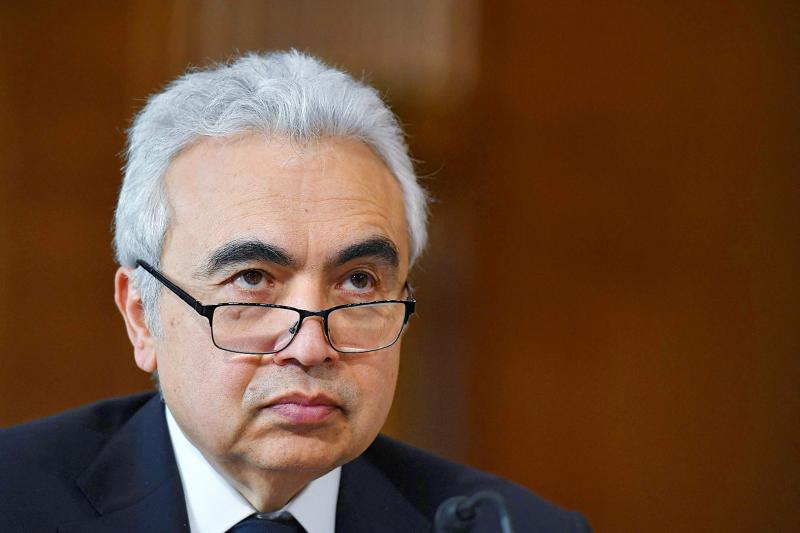Clean energy remains just a tiny part of plans for economic recovery after the COVID-19 pandemic, despite some improvement, the International Energy Agency (IEA) said yesterday as it warned that carbon dioxide emissions are set to rebound.
Investments in clean energy — whether it is renewable production from renewable sources, electric vehicles or efficiency measures — represent only 3 percent of the US$16.9 trillion mobilized globally for recovery plans, the IEA said.
That is up from 2 percent when the IEA first issued a report on the subject in July.

Photo: AFP
“Recovery plans globally are still insufficient to put emissions into structural decline,” said the Paris-based agency, which advises governments of industrialized nations on energy policy.
Moreover, it warned that “lead times on many recovery measures prevent them from reining in the immediate rebound in [carbon dioxide] emissions, which is set to be the second-largest in history” this year.
Over the longer term, absent significant steps, “global emissions are set to continue to diverge sharply from a path consistent with net-zero emissions from the energy sector by 2050,” it said.
The IEA’s warning came ahead of a G20 leaders summit at the weekend, as well as the COP26 summit in Glasgow, Scotland.
The agency says that about US$470 billion has been earmarked by governments for clean energy projects through 2030, a 20 percent increase from July.
However, it said that there is a growing divide between some advanced economies and less-wealthy nations where green investments are sorely necessary.
“The shortfall in sustainable recovery spending in emerging and developing economies is a global problem that requires a global solution,” IEA director Fatih Birol said in a statement.

The US government has signed defense cooperation agreements with Japan and the Philippines to boost the deterrence capabilities of countries in the first island chain, a report by the National Security Bureau (NSB) showed. The main countries on the first island chain include the two nations and Taiwan. The bureau is to present the report at a meeting of the legislature’s Foreign Affairs and National Defense Committee tomorrow. The US military has deployed Typhon missile systems to Japan’s Yamaguchi Prefecture and Zambales province in the Philippines during their joint military exercises. It has also installed NMESIS anti-ship systems in Japan’s Okinawa

TRAGEDY STRIKES TAIPEI: The suspect died after falling off a building after he threw smoke grenades into Taipei Main Station and went on a killing spree in Zhongshan A 27-year-old suspect allegedly threw smoke grenades in Taipei Main Station and then proceeded to Zhongshan MRT Station in a random killing spree that resulted in the death of the suspect and two other civilians, and seven injured, including one in critical condition, as of press time last night. The suspect, identified as a man surnamed Chang Wen (張文), allegedly began the attack at Taipei Main Station, the Taipei Fire Department said, adding that it received a report at 5:24pm that smoke grenades had been thrown in the station. One man in his 50s was rushed to hospital after a cardiac arrest

‘WIN-WIN’: The Philippines, and central and eastern European countries are important potential drone cooperation partners, Minister of Foreign Affairs Lin Chia-lung said Minister of Foreign Affairs Lin Chia-lung (林佳龍) in an interview published yesterday confirmed that there are joint ventures between Taiwan and Poland in the drone industry. Lin made the remark in an exclusive interview with the Chinese-language Liberty Times (the Taipei Times’ sister paper). The government-backed Taiwan Excellence Drone International Business Opportunities Alliance and the Polish Chamber of Unmanned Systems on Wednesday last week signed a memorandum of understanding in Poland to develop a “non-China” supply chain for drones and work together on key technologies. Asked if Taiwan prioritized Poland among central and eastern European countries in drone collaboration, Lin

ON ALERT: Taiwan’s partners would issue warnings if China attempted to use Interpol to target Taiwanese, and the global body has mechanisms to prevent it, an official said China has stationed two to four people specializing in Taiwan affairs at its embassies in several democratic countries to monitor and harass Taiwanese, actions that the host nations would not tolerate, National Security Bureau (NSB) Director-General Tsai Ming-yen (蔡明彥) said yesterday. Tsai made the comments at a meeting of the legislature’s Foreign Affairs and National Defense Committee, which asked him and Minister of National Defense Wellington Koo (顧立雄) to report on potential conflicts in the Taiwan Strait and military preparedness. Democratic Progressive Party (DPP) Legislator Michelle Lin (林楚茵) expressed concern that Beijing has posted personnel from China’s Taiwan Affairs Office to its